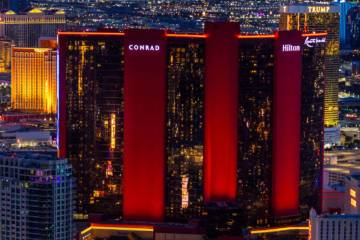Speculation abounds on casino industry mergers, acquisitions
International Game Technology is the most prominent gaming company with a “For Sale” sign planted in the front yard.
But the slot machine giant is not alone.
For the first time since the recession dried up credit markets and brought mergers and acquisition activity to a standstill, the casino industry is awash with speculation about transactions.
Over the next few months, several big-name casino operators and equipment manufacturers could change hands.
Three transactions completed in 2013 — Bally Technologies’ $1.3 billion purchase of SHFL entertainment, Scientific Games’ $1.5 billion acquisition of WMS Industries and Pinnacle Entertainment’s $2.8 billion buyout of Ameristar Casinos — turned up the flame on the boiling pot of speculation.
After IGT said in June it was exploring “a broad range of strategic alternatives,” the door opened to several gaming industry mergers.
On Monday, Australian slot machine builder Aristrocrat Technologies paid $1.28 billion for Video Gaming Technologies, a privately held Franklin, Tenn.-based company that is one of the leading providers of slot machines to American Indian casinos.
A week earlier, Aristocrat bought privately owned Paltronics, which makes video poker machines, table games, slot machine bonus systems and progressive jackpot applications.
“We like the move by Aristocrat as it expands the company’s North America presence, increases is gaming operations business and adds a key product offering,” Eilers Research founder Todd Eilers told investors. “In addition, we believe there are both revenue and cost synergy opportunities.”
Last week Reuters news service reported that regional casino operator Isle of Capri Casinos was in talks to be acquired by Gaming and Leisure Properties Inc., a real estate investment trust controlled by rival Penn National Gaming. Reuters placed an enterprise value of $1.29 billion on Isle of Capri, which has 15 casinos and racetracks in seven states.
Gaming and Leisure Properties has been active since being spun off by Penn National at the end of 2013. The company acquired an Illinois riverboat casino earlier this year and struck a deal in May to buy a Pittsburgh racetrack from Cannery Casino Resorts for $465 million.
Penn National placed 21 of it 29 casinos and racetracks — including M Resort — into the REIT. Penn operates the casinos on a leaseback agreement. By law, REITs don’t pay federal taxes and receive the vast majority of their income from rent and real estate. REITs distribute 90 percent of their earnings to shareholders.
Deutsche Bank gaming analyst Carlo Santarelli doubted the Isle of Capri casinos would be leased back to the St. Louis-based company.
“We see a straight sale as more likely,” he said, meaning the REIT would need to find multiple operators to run the casinos.
Santarelli said the transaction would be “powerful” to the bottom line for Gaming and Leisure Properties.
Sale of IGT, the leading slot machine provider for almost three decades, would send shock waves through the casino community. Union Gaming Group analyst Robert Shore speculated the sale could eclipse the $4.9 billion Canadian firm Amaya is paying for Internet gaming giant PokerStars.
Even at $5.7 billion — Shore’s total for IGT, including debt and market capitalization — the transaction would not match the industry’s two biggest deals: MGM Mirage’s $7.9 billion purchase of Mandalay Resort Group and Harrah’s Entertainment’s $9 billion buyout of Caesars Entertainment. Both were completed in 2005.
Shore predicted a private equity buyer IGT’s most likely suitor, although lottery giant GTECH has been linked to a possible transaction. An IGT deal would also require more than 300 jurisdictional approvals.
“The long and likely invasive licensure process is not a deal-breaker for financial buyers,” Shore said.
Private equity has significant available capital, and companies are involved in multiple industries. The regulatory environment is tolerable because “financial buyers simply seek to put money to work.”
Shore said “the sheer magnitude” of the check needed to finalize the transaction dramatically “limits the pool” of perspective financial buyers.
IGT offers a buyer “free cash flow generation, niche positioning of the business, strategic divestiture opportunities, and potential fundamental turn-around,” he said.
Rival slot machine giant Bally Technologies, however, is not going to buy IGT. Bally, fresh off the SHFL acquisition, is spending up to $100 million on a social gaming business.
The mere mention of antitrust issues surrounding a Bally-IGT deal alone would cause heads to explode at the Federal Trade Commission.
Howard Stutz’s Inside Gaming column appears Wednesdays and Sundays. He can be reached at hstutz@reviewjournal.com or 702-477-3871. Follow on Twitter: @howardstutz.
















